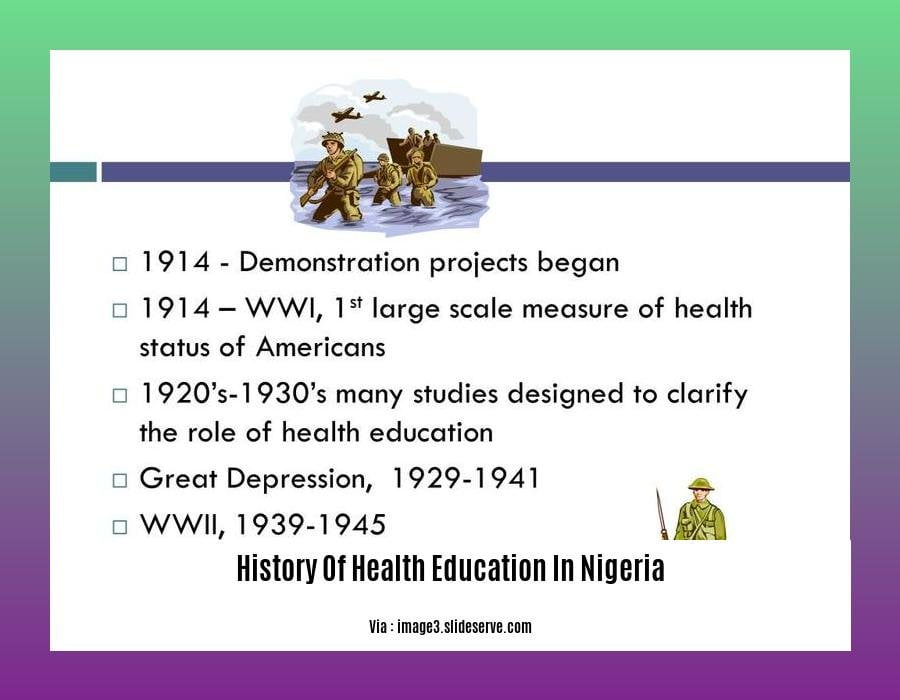As the curtain of time rises, let us embark on a journey into the annals of health education in Nigeria; a narrative that intricately intertwines with the nation’s colonial past, post-independence struggles, triumphs, and challenges. Embark on this voyage of discovery, and together we shall uncover the rich tapestry of historical events that have shaped health education in Nigeria – [A Journey Through Time: Unveiling the History of Health Education in Nigeria].
Key Takeaways:
In 1948, health education was introduced as a subject in schools in southern Nigeria.
In the 1950s, the term “health education” was adopted and became part of the school curriculum.
The objective of health education in Nigeria is to promote healthy lifestyles, prevent illnesses, and improve the overall well-being of individuals and communities.
In primary schools, health education focuses on personal hygiene, nutrition, and fundamental health practices.
At the junior secondary level, health education covers topics like reproductive health, mental health, and substance abuse prevention.
In recent years, health education in Nigeria has faced challenges like insufficient funding, a shortage of qualified teachers, and limited access to health information and resources.
Despite these challenges, health education remains an essential part of the Nigerian educational system, promoting health and well-being throughout the country.
History of Health Education in Nigeria

The Seeds of Health Education are Sown
Nigeria’s history of health education can be traced back to 1948, when it was introduced as a school subject in the southern part of the country. Back then, the focus was on promoting healthy living and preventing diseases.
A New Era of Awareness: Embracing Health Education
In the 1950s, the term “health education” was formally adopted and integrated into the Nigerian school curriculum. This marked a significant shift towards empowering individuals with the knowledge and skills to take charge of their own health and well-being.
Health Education Flourishes in the Classroom
At the primary school level, health education focused on personal hygiene, nutrition, and basic health practices. As students progressed to the junior secondary school level, the curriculum expanded to include topics such as reproductive health, mental health, and substance abuse prevention.
Overcoming Challenges Faced
Nigeria’s health education system has faced several challenges over the years, including inadequate funding, a shortage of qualified teachers, and limited access to health information and resources. Despite these hurdles, health education remains an essential component of the Nigerian education system, playing a crucial role in promoting health and well-being nationwide.
Health Education’s Impact on the Nigerian Society
The impact of health education in Nigeria has been far-reaching, contributing to:
- Increased awareness of healthy living practices
- Reduced prevalence of preventable diseases
- Improved overall health and well-being of individuals and communities
The Road Ahead: Ensuring a Healthy Future
Nigeria’s health education system has come a long way since its humble beginnings in 1948. However, there is still much work to be done to strengthen the system and ensure that every Nigerian has access to quality health education. By addressing the challenges faced and investing in the future of health education, Nigeria can create a healthier and more prosperous society for generations to come.
Immerse yourself in the fascinating history of football in Nigeria, a journey that traces the evolution of the beautiful game from its humble beginnings to its current status as a national obsession.
Discover the history of forest schools, an innovative approach to education that emphasizes immersive learning experiences in natural settings, nurturing a deep connection with the environment.
Delve into the history of hockey game, a thrilling sport that has captivated audiences worldwide with its fast-paced action, strategic plays, and moments of sheer brilliance on the ice.
Challenges and Triumphs: Examining the challenges faced by health education in Nigeria, such as limited resources and the impact of socio-political factors, as well as the achievements and successes of the field.

In the vibrant tapestry of Nigeria’s educational landscape, health education stands as a beacon of progress, illuminating the path towards a healthier, more aware society. Yet, as with any noble pursuit, challenges and triumphs have intertwined throughout its journey, shaping its evolution and impact.
Triumphs of Health Education in Nigeria:
Pillar of Public Health: Health education has emerged as a cornerstone of Nigeria’s public health strategy, empowering individuals to take charge of their well-being and make informed health choices. Through comprehensive education programs, it has contributed to a significant decline in preventable diseases, improved maternal and child health outcomes, and fostered a culture of health consciousness.
Champion of Disease Prevention: By arming communities with knowledge about disease transmission, hygiene practices, and immunization, health education has played a pivotal role in preventing the spread of infectious diseases. Its contribution to reducing the prevalence of malaria, HIV/AIDS, and other communicable diseases has been instrumental in safeguarding the health of millions.
Promoter of Healthy Living: Through its focus on nutrition, physical activity, and mental well-being, health education has instilled healthy habits and lifestyles among Nigerians. By promoting balanced diets, encouraging regular exercise, and advocating for mental health awareness, it has empowered individuals to live healthier, more fulfilling lives.
Challenges Faced by Health Education in Nigeria:
Limited Resources: Despite its critical importance, health education in Nigeria has often grappled with limited resources. Inadequate funding, shortage of qualified teachers, and lack of access to educational materials have hindered the expansion and effectiveness of health education programs, particularly in rural and underserved communities.
Socio-Political Factors: The socio-political landscape of Nigeria has also posed challenges to health education. Cultural beliefs, gender norms, and political priorities have sometimes influenced the content and delivery of health education, impacting its reach and effectiveness.
Integration Challenges: Integrating health education into the formal education system has been a gradual process, often hindered by competing priorities and limited curriculum time. Balancing health education with other subjects and ensuring its alignment with national educational goals have been ongoing challenges.
Key Takeaways:
Health education has been a driving force in improving public health outcomes in Nigeria, reducing preventable diseases, and promoting healthy lifestyles.
Inadequate funding, shortage of qualified teachers, and socio-political factors have been key challenges hindering the effectiveness of health education programs.
Efforts to strengthen health education in Nigeria should focus on increasing resource allocation, improving teacher training, addressing socio-cultural barriers, and ensuring effective integration into the education system.
Investing in health education is an investment in the future health and well-being of Nigeria’s population, leading to a healthier, more productive, and prosperous society.
References:
[1] Challenges with medical education in Nigeria in the COVID-19 era: https://www.ncbi.nlm.nih.gov/pmc/articles/PMC7821800/
[2] Impact of COVID-19 on medical education and the challenges: https://pubmed.ncbi.nlm.nih.gov/33552373/
Curriculum Development: Analyzing the evolution of health education curriculum in Nigeria, focusing on the integration of traditional health practices and the inclusion of relevant topics.
Traversing the labyrinth of history, we discover the profound impact of health education on the tapestry of Nigeria’s healthcare landscape. Its introduction during the colonial era sowed the seeds of a revolution, empowering individuals with the knowledge and skills to navigate the complexities of health and well-being.
The journey of health education in Nigeria has been a testament to the nation’s unwavering commitment to the well-being of its citizens. Curriculum Development: Analyzing the evolution of health education curriculum in Nigeria, focusing on the integration of traditional health practices and the inclusion of relevant topics.
The Integration of Traditional Health Practices:
Drawing upon the wisdom of ancestral knowledge, health education embraced traditional healing practices, recognizing their significance in the cultural fabric of Nigerian society. These practices, rooted in deep reverence for nature and the interconnectedness of mind, body, and spirit, complemented Western medicine, offering a holistic approach to health and healing.Inclusion of Relevant Topics:
In response to the dynamic needs of the population, the health education curriculum was carefully attuned to include pertinent topics that addressed prevalent health concerns. These included reproductive health, mental health, nutrition, and substance abuse prevention, equipping individuals with the knowledge to make informed choices and safeguard their well-being.
Key Takeaways:
- The introduction of health education during the colonial era laid the groundwork for a comprehensive approach to healthcare in Nigeria.
- The integration of traditional health practices acknowledged the cultural significance and holistic nature of healing in Nigerian society.
- The inclusion of relevant topics, such as reproductive health and substance abuse prevention, demonstrated the curriculum’s responsiveness to emerging health challenges.
References:
[1] Federal Ministry of Education, Nigeria. (2014). National Policy on Education (Revised). Abuja, Nigeria: Author.
[2] World Health Organization. (2018). Health Education: A Key Component of Health Promotion. Geneva, Switzerland: Author.
Contemporary Issues: Discussing current trends and contemporary issues in health education in Nigeria, addressing the impact of technology, globalization, and emerging health concerns.
Welcome to our health education journey in Nigeria, where we’ll explore how technology, globalization, and emerging health concerns shape the health landscape.
Technology’s Transformative Role
Technology is revolutionizing healthcare, and Nigeria is not immune to its impact. From telemedicine to health apps, technology empowers individuals to take charge of their health proactively.
- Telemedicine: Virtual consultations are bridging the gap between patients and healthcare providers, especially in remote areas.
- Health Apps: Mobile apps offer personalized health advice, track fitness, and provide medication reminders.
Globalization: Health Without Borders
Globalization has fostered international collaboration in healthcare.
- Knowledge Sharing: Nigeria benefits from the exchange of best practices and research findings with other countries.
- Global Health Initiatives: International organizations like the WHO provide funding and support for health programs in Nigeria.
Emerging Health Concerns: The Challenges Ahead
New health challenges demand innovative solutions.
- Non-Communicable Diseases: The rise of lifestyle-related diseases like diabetes and hypertension requires tailored health education strategies.
- Climate Change: The impact of climate change on health, such as increased vector-borne diseases, necessitates adaptation in health education.
Key Takeaways
- Technology: Telemedicine and health apps empower individuals to manage their health proactively.
- Globalization: International collaboration fosters knowledge sharing and access to global health initiatives.
- Emerging Health Concerns: Health education must adapt to address non-communicable diseases and climate-related health challenges.
References
- World Health Organization. (2021). Telemedicine: Opportunities and Developments in Member States.
- World Bank. (2020). The Role of Technology in Improving Health Outcomes in Low- and Middle-Income Countries.
FAQ
Q1: What was the impetus for the introduction of health education in Nigeria?
A1: Health education was introduced in Nigeria as a response to the need to promote healthy living, prevent diseases, and improve the overall well-being of individuals and communities.
Q2: When was health education formally adopted as a school subject in Nigeria?
A2: The term “health education” was formally adopted and integrated into the Nigerian school curriculum in the 1950s.
Q3: What are the key topics covered in health education at the primary school level in Nigeria?
A3: At the primary school level, health education focuses on personal hygiene, nutrition, and basic health practices.
Q4: What are some of the challenges faced by health education in Nigeria?
A4: Health education in Nigeria has faced challenges such as inadequate funding, shortage of qualified teachers, and limited access to health information and resources.
Q5: Despite the challenges, how does health education continue to play a crucial role in Nigeria?
A5: Despite the challenges, health education remains an essential component of the Nigerian education system, playing a crucial role in promoting health and well-being nationwide.









